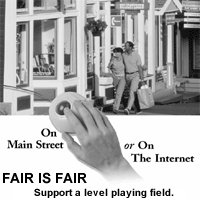|
In October of 1998, Congress voted the Internet Tax Freedom Act into
law. The law established a three-year moratorium on new Internet access
taxes and on multiple or discriminatory taxes on electronic commerce.
However, the legislation did not prevent states and localities from
collecting existing sales tax on purchases made over the Internet. As it
stands now, Internet retailers are subject to the same sales taxes as
mail-order retailers. This means, if the seller has a physical nexus in a
state (a store, a warehouse or office) then the seller must collect state
and local taxes. If the seller does not have a physical nexus in the state
the consumer is responsible for paying the tax directly to the state. Few
consumers do. In fact, in 1999, according to Forrester Research, more than
half a billion dollars in sales taxes were not collected on Internet
purchases.
The passage of the Internet Tax Freedom Act mandated that an Advisory
Commission on Electronic Commerce be formed to recommend solutions to the
taxation question. After nearly two-years of meetings, in March of this
year the Advisory Commission approved a report that asks Congress to
extend the existing ban on Internet taxes for five years and includes a
host of tax exemptions favoring high-tech companies. For instance, if
Congress adopts this proposal all books, music and software that currently
are subject to state and local sales taxes would be tax-free. It is hard
to believe it is the intent of the Advisory Commission to erode the tax
base of local governments. But that is exactly what will happen if this
legislation is passed and consumers choose to purchase via the Internet
because they don't have to pay sales tax. Sales taxes account for
approximately 49% of state and local government's revenue; revenue that
pays for schools, hospitals, roads, police and fire protection. To deny
states the ability to collect taxes due on purchases made via the Internet
and in the process hurt brick-and-mortar retailers and local communities
they serve is wrong.
In May, the United States House of Representatives passed legislation
that would extend, for five additional years through October of 2006, the
current Internet tax moratorium. The debate has now moved to the Senate
where ICSC is working to ensure that the Senate does not pass similar
language.
ICSC is working with a coalition of retailers and municipal officials
to get the word out that Internet retailers should be responsible for
collecting state and local taxes just like brick-and-mortar retailers.
With sales taxes accounting for, in some cases, 49% of a state's revenue,
ICSC recognizes that sales taxes are vitally important to the financial
stability of many communities throughout the nation. Legislation that
gives a competitive advantage to one form of retail over another, and has
the potential to undermine the ability of local governments to finance
their operations is wrong and needs to be corrected. |
Click the image For Details




|

